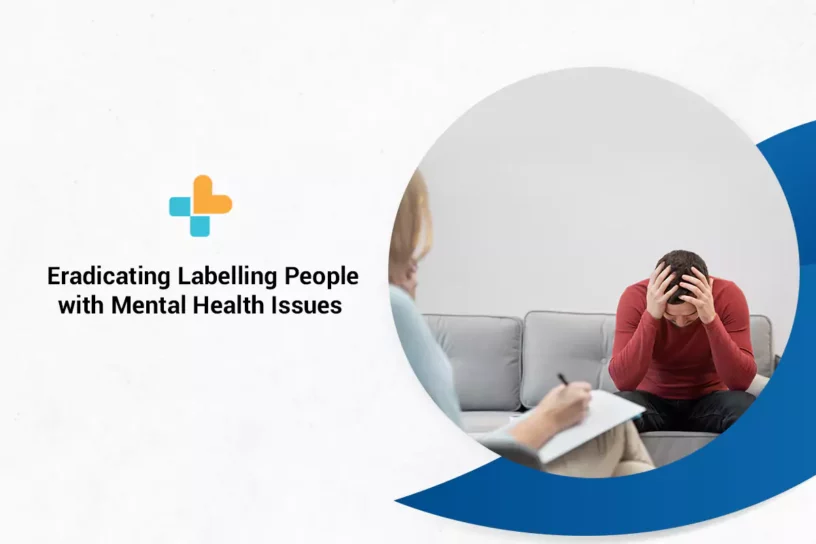Labels don’t just put limits on people; in a way, it pushes aside their humanity. This is true, especially when it comes to mental health issues. It’s an established fact that one in every eight people around the world has a mental disorder.
Labelling people with mental health issues as “mentally ill” or “crazy” produces a sense of shame and isolation that can be difficult to overcome. This stigma might keep people from getting help, forcing them to suffer alone.
In this post, we’ll explore why eradicating labelling people with mental health issues is so important, as well as practical methods for creating an inclusive and compassionate community.
Ways You Can Reduce Stigma Around Mental Health Issues
Here are some strategies that can help eradicate labelling people with mental health issues.
1. Awareness and Understanding: Increasing Awareness of Mental Health Issues
Due to the stigma surrounding mental health issues, people often avoid seeking professional help. This can be fixed by taking the first step and increasing awareness. Awareness promotes help-seeking behaviour, leading to improved mental health outcomes for individuals, families, and communities.
Education can be aimed at schools, workplaces, and other community organizations to highlight the signs and symptoms of mental health problems and provide information on treatment options. Opt for channels like educational campaigns, public health messages, and community outreach.
2. Person-Centred Language: Emphasizing the Person, Not the Diagnosis
Person-centred language is a communication strategy that focuses on the individual rather than their diagnosis or condition. By shifting the emphasis away from the condition and towards the individual’s unique strengths, abilities, and potential, we can see that their mental health issues do not define them.
Changing how we address people with mental illnesses is one example of this. Instead of the commonly used term “the mentally ill”, we can say “people with mental illness” or “he has schizophrenia” instead of “he is schizophrenic”. This approach has the potential to reduce the stigma associated with mental health and foster a more inclusive and understanding society.
3. Positive Portrayals: Promoting Positive Images of Mental Health in the Media
We’re aware of the massive influence that the media can have on our everyday perceptions of general ideas. This is reflected in the significant role it plays in shaping our perceptions of mental health issues.
Unfortunately, stereotypes and negative attitudes about mental health are frequently reinforced in the media. By understanding and spreading awareness that your average portrayal of someone with a mental illness isn’t accurate, we can avoid stereotypes and negative language around the subject.
Individuals can be represented in a variety of ways, including through complex characterizations that highlight their strengths and abilities. It’s best to avoid one-dimensional caricatures that focus on their conditions and diagnoses in a negative context.
4. Normalizing Treatment: Making Mental Health Treatment Commonplace
Normalizing mental health treatment is crucial to combating the stigma surrounding mental health. This involves promoting the idea that seeking help for mental health issues is as normal and necessary as seeking help for physical health problems.
Raising public awareness, improving access to mental health resources and services, and advocating for the use of therapy and medication are important ways to achieve this.
Encouraging individuals to discuss mental health openly and share their personal experiences can create a safe and accepting space. Prioritizing mental health and treating it with the same importance as physical health can improve the overall well-being of individuals and society.
Also Read : Anxiety Issues: Diagnosis, Therapy, and Medication
Address Mental Health Issues With Ayu Health
There’s no doubt that eradicating the labelling of individuals with mental health issues can help create a more inclusive and compassionate community. We must strive to break down the barriers of stigma and shame that prevent individuals from seeking the help they need.
At Ayu Health, we believe in promoting mental wellness and providing a safe space for individuals to discuss their mental health concerns without fear of judgement.
If you or someone you know is struggling with mental health issues, please don’t hesitate to contact Ayu Health. Let us help you or your loved ones access the care and support they need. Contact us today to schedule an appointment or learn more about our services.
Our Hospital Locations
General Surgery Hospitals in Chandigarh | General Surgery Hospitals in Bangalore | General Surgery Hospitals in Jaipur | General Surgery Hospitals in NCR | General Surgery Hospitals in Hyderabad
Our Doctors
General Surgery Doctors in Chandigarh | General Surgery Doctors in Bangalore | General Surgery Doctors in Jaipur | General Surgery Doctors in NCR | General Surgery Doctors in Hyderabad
About the Author

Dr. S. Goel
Dr. S. Goel is a renowned Internal Medicine Specialist currently practicing at Ayu Health, Bangalore. He is a Specialist in Internal Medicine, Diabetes HTN, Paediatric Care, and Family Medicine.




